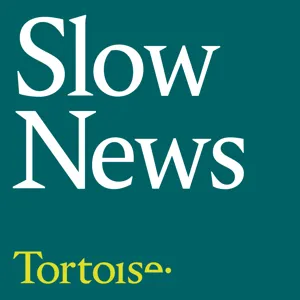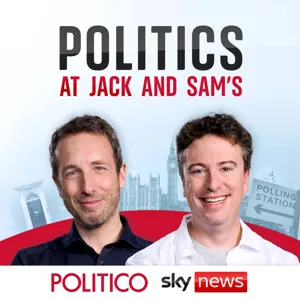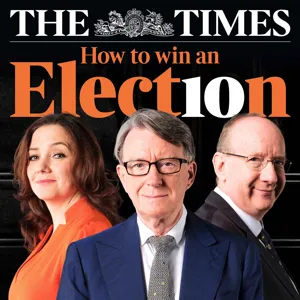Podcast Summary
Exploring LinkedIn for Small Business Hiring and Labour Party's Journey: LinkedIn is a powerful tool for small businesses to find potential hires, Labour Party's '8 years hard labor' series offers insights into its recent history, and blue Nile provides high-quality lab-grown diamonds at competitive prices.
LinkedIn is a valuable resource for small businesses looking to hire professionals. It's where you can find candidates who might not be actively searching for a new job but could be open to the right opportunity. In fact, over 70% of LinkedIn users don't visit other leading job sites in a given month. So, if you're in the market for new hires, make sure to utilize LinkedIn to increase your chances of finding the best talent. Additionally, the political landscape is undergoing significant changes on both sides of the Atlantic. In the UK, the next election could result in a change of party for the first time in 14 years. To understand the journey of the Labour Party and the events that have shaped it over the past 8 years, Tortoise is releasing a 6-part series called "8 years hard labor." This series will provide insights into the internal workings of the Labour Party and help us make sense of its recent history. Meanwhile, if you're in the market for a sparkling gemstone, consider checking out blue Nile for beautiful lab-grown diamonds. These diamonds are independently graded and guaranteed to be identical to natural diamonds. Use the promo code "listen" to get $50 off your purchase of $500 or more. In summary, LinkedIn is a must-visit platform for small businesses looking to hire, the Labour Party's journey over the past 8 years is an intriguing story worth exploring, and blue Nile offers high-quality lab-grown diamonds at attractive prices.
Miliband's resignation triggered unexpected changes in Labour Party and British politics: Miliband's resignation led to a radical new leader, new electoral system, influx of new members, and significant shift in Labour Party ideology, shaping British politics.
The sudden resignation of Ed Miliband after the 2015 Labour Party election defeat set off a chain reaction of events that fundamentally transformed the party and British politics. Miliband's decision to resign immediately led to the unexpected election of a radical new leader, and the implementation of a new electoral system that gave more power to individual party members. This shift allowed for the influx of new centrist members and weakened the influence of unions. The ensuing years saw internal battles, more election defeats, and a significant shift in the party's ideology. The new rules and leadership paved the way for a double revolution inside the Labour Party, shaping Britain's political landscape for years to come.
The unexpected rise of Jeremy Corbyn as Labour Party leader: Corbyn's surprising success was due to underestimated disaffection of newer party members and his lack of initial enthusiasm made him a plausible candidate for the left wing group.
The unexpected rise of Jeremy Corbyn to become the leader of the Labour Party in the UK was due to a combination of factors. Despite being a long-standing left-wing MP with a reputation for odd interests and admirable causes, he was not initially seen as a serious contender due to his past enemies within the party. However, the disaffection of newer members towards the establishment was underestimated, leading to Corbyn's surprising success in getting enough nominations to make it to the final ballot. Many MPs, including those who knew Corbyn personally, were unsure if he was up to the job of being the standard bearer for the left and questioned his genuine desire to be leader. Ultimately, Corbyn's lack of initial enthusiasm and reluctance to campaign made him an unlikely yet plausible candidate for the left wing group to rally behind.
Unexpected rise of Jeremy Corbyn as Labour Party leader: Corbyn's unexpected win was driven by emotional response to party's previous loss and his decent, moral image, despite skepticism and concerns about potential consequences.
Jeremy Corbyn's unexpected rise to leadership of the British Labour Party was driven by a need for representation from the left wing, despite widespread skepticism about his chances of winning. Many in the party saw him as a decent, moral figure with no enemies, making him an acceptable candidate to give legitimacy to the contest. However, few expected him to win, and those who did, including the speaker, had grave concerns about the potential consequences. When Corbyn unexpectedly made it onto the ballot, there was a collective denial among Labour members about the reasons for their previous election loss, leading to an emotional response in favor of a more left-wing candidate. Despite initial mild encouragement in his campaign, it was widely expected to be a failure.
The 2015 Labour leadership race: A turning point for British politics: Jeremy Corbyn's unexpected rise in the 2015 Labour leadership race was fueled by grassroots support and a commitment to addressing poverty and housing. His straightforward communication resonated with a broader base, signaling a shift in the political landscape.
The 2015 Labour leadership race was a turning point in British politics, marked by the unexpected rise of Jeremy Corbyn. Even before his impressive showing in the hustings, supporters like Len McCluskey and Jamie Driscoll noticed his straightforward communication and commitment to addressing poverty and housing. The energy and excitement around Corbyn was palpable, even to political newcomers like Sam Tarry and the newly-elected MPs. Despite the experienced candidates' business-as-usual approach, Corbyn's message resonated with a broader base, leading to his surprising success in the race. This grassroots support defied expectations and signaled a shift in the political landscape.
Labor Party's Surprising Leadership Race: Jeremy Corbyn's authenticity and anti-establishment appeal, fueled by organized labor and young voters, defied media skepticism and led to his surprising victory in the 2015 Labour Party leadership race, thanks to an efficient campaign machine.
The 2015 Labour Party leadership race was not a foregone conclusion for front-runner Andy Burnham. The underestimation of the organized anger and agitation among labor members against austerity, which had grown into grassroots organizations like the People's Assembly Against Austerity, allowed Jeremy Corbyn to tap into a zeitgeist and bring together the organized labor and young voters. This powerful surge of support was evident in the oversubscribed rallies and the efficient online signing up of new members. Despite skepticism from the mainstream media, Corbyn's authenticity and anti-establishment appeal resonated with the electorate. The crucial difference this time was that the organized crowds were accompanied by an efficient campaign machine, which proved instrumental in gathering data and mobilizing support, ultimately leading to Corbyn's surprise victory.
Unexpected Labour Party Leadership Race Result for Jeremy Corbyn: Jeremy Corbyn's unexpected lead in the 1981 Labour Party leadership race caused tension and infighting among Labour MPs, but his campaign remained confident due to strong support.
The 1981 Labour Party leadership race saw a surprising lead for Jeremy Corbyn, which was initially met with skepticism but later confirmed by polls. Corbyn's strong showing came as a shock to many, including the other campaigns, and caused fear and infighting among Labour MPs. Despite this, Corbyn's campaign was confident due to the clear energy and support around him. The poll results were initially uncovered through data analysis and private polls, and were met with disbelief until they were published in newspapers. This unexpected turn of events caused tension within the Labour Party, with most MPs expressing concern over Corbyn's potential leadership.
Corbyn's surprise win and the need to prepare for power: Despite lacking government experience, Corbyn's unexpected win as Labour Party leader required preparation for power, including appointing people to the shadow cabinet, despite opposition from a significant portion of the PLP and the need for an inclusive team.
The unexpected landslide victory of Jeremy Corbyn as Labour Party leader in 2015, despite his lack of government experience, marked a significant turning point in British politics. The moment of revelation came when the poll results aligned with their internal analysis, prompting the need to prepare for the possibility of winning and managing the operation of appointing people to the shadow cabinet. However, Corbyn faced opposition from a significant portion of the PLP, and his advisors aimed for an inclusive shadow cabinet. Len McCluskey, a major Corbyn supporter and experienced union leader, played a role in the election and attempted to shape the political landscape. Corbyn's mandate, which dwarfed any previously given to a British political party leader, set the stage for a period of change and challenge in British politics.
Labour Party's internal power struggle following Corbyn's election: Despite reservations, Labour MPs served under Corbyn, and Momentum was founded to support the labor left. Corbyn defied expectations and enjoyed his role as leader, emphasizing the importance of respecting democratic process and working towards the party's mission.
The Labour Party's internal power struggle following Jeremy Corbyn's election as leader in 2015 was a warning sign of the party's precarious position without grassroots support. Len McCluskey of Unite delivered a message that John McDonnell should not be shadow chancellor, causing swift reaction against external interference. John Landsman responded by founding Momentum to support the labor left. Most Labour MPs decided to serve under Corbyn despite reservations, including Carolyn Harris and Sir Keir Starmer. Corbyn himself seemed to enjoy his role as leader, defying expectations of a short tenure. Despite the challenges, the Labour Party's mission and purpose is to create a government, and its members had a duty to respect the democratic process and make it work.
Public calls for change in Parliament and major political decisions: The public wants to be heard in Parliament, and significant decisions like EU membership require attention.
That the public expressed a desire for change in the way Prime Minister's Question Time was conducted and for their voices to be heard in parliament. The speaker, David Aronovich, shared his observations on the political landscape, particularly the rise of Jeremy Corbyn as Labour Party leader. He also highlighted the upcoming decision for the country regarding EU membership. Amidst these serious matters, advertisements for Tortoise, Reeward Gateway Eden, and 1-800-Flowers were interspersed. In summary, the public's call for representation and the significance of major political decisions were the key themes of the discussion.





